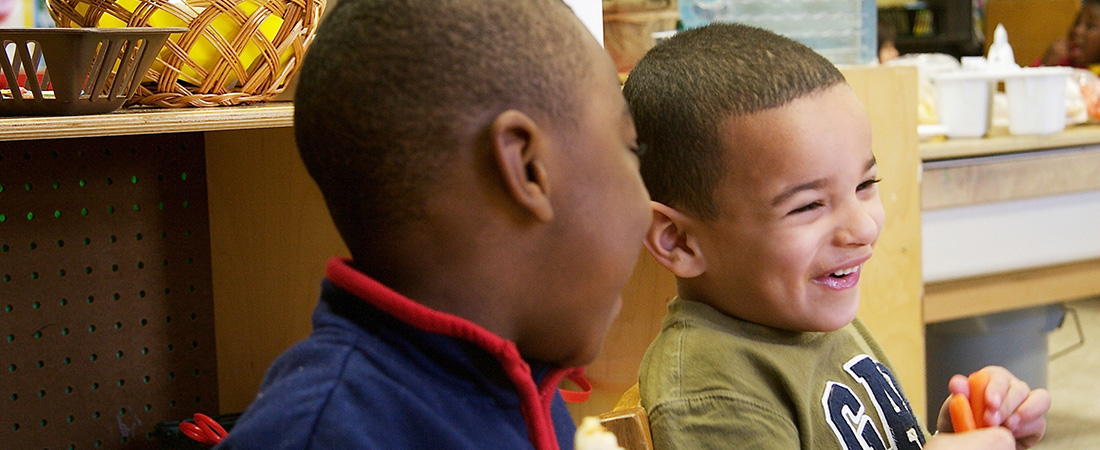What's Troubling Our Children?

As the American Psychological Association notes, “Mental health—an essential part of children’s overall health—has a complex interactive relationship with their physical health and their ability to succeed in school, at work and in society.” And Nancy Topping-Tailby, who has worked for more than 30 years to support young children’s physical and mental health, agrees. “For kids to learn, they have to be healthy,” she says.
A practicing, licensed independent clinical social worker, Topping-Tailby is director of the EDC team for the Head Start National Center on Health, under the direction of the American Academy of Pediatrics. She offers her insights on children’s behavioral problems and Head Start’s comprehensive approach to helping families raise healthy children.
Q: How early can serious problem behaviors present themselves?
 Topping-Tailby: Typically, clinicians don’t see children until they’re 4 or 5 at the youngest, but I’ve worked with parents with babies and toddlers around a whole host of issues that have to do with feeding and sleeping or other problems with self-regulation. Some children who have been adopted have trouble forming attachments. Other children have experienced some kind of family instability or trauma, so they’re really having difficulty. The parents are looking for help.
Topping-Tailby: Typically, clinicians don’t see children until they’re 4 or 5 at the youngest, but I’ve worked with parents with babies and toddlers around a whole host of issues that have to do with feeding and sleeping or other problems with self-regulation. Some children who have been adopted have trouble forming attachments. Other children have experienced some kind of family instability or trauma, so they’re really having difficulty. The parents are looking for help.
Q: Are children’s behavioral problems getting worse?
Topping-Tailby: Over the trajectory of my career, I’ve seen more and more children who can’t regulate their emotions or behaviors. In order to function in a classroom, children have to be able to listen, focus, and pay attention, as well as tolerate a bit of frustration and wait for their turn. The kids who are disruptive don’t have the necessary foundational skills to be successful in an early learning environment. Therefore, it becomes more difficult to teach them.
Q: What can be done to address problem behaviors before they escalate?
Topping-Tailby: Children’s social and emotional development is important for them to have rich, productive lives. Since its inception, Head Start has emphasized comprehensive services to help children get ready for school, rather than just a narrow academic focus. In Head Start classrooms, we work a lot on promoting prosocial behaviors and helping kids to problem-solve and build language skills. We support the kids who are impulsive or don’t know what to do, and try to anticipate children’s behavior so that we can redirect them to make better choices. We believe in promotion and prevention, identifying children who are having problems with self-regulation and executive functioning as early as possible and intervening to offer the support they need to do well in an early learning environment.
When I started out as a mental health consultant with Head Start, I gave teachers strategies about how to work with these children to help them use a problem-solving approach. We engaged families in a way that drew on their strengths, so we could try and figure out what was going on without suggesting that something was “wrong” with their children. That work continues to this day.
While much of my experience has been with Head Start, I am pleased that other early childhood efforts provide similar supports to children in non-Head Start environments. For example, SAMHSA’s Project LAUNCH was designed to help states and communities adopt mental health promotion and prevention strategies including behavioral screening and early childhood mental health consultation. HRSA’s Early Childhood Comprehensive Systems (ECCS) grants have also focused on helping states and communities build and integrate early childhood service systems that better meet the needs of children and families. One of the five key ECCS components includes early childhood mental health services to promote children’s social-emotional development and mitigate the impact of toxic stress and trauma in infancy and early childhood. And finally, many states have included children’s social-emotional development in their Quality Rating and Improvement Systems (QRIS).
All of these efforts recognize that for children to learn, they have to be healthy. We have to nurture their self-esteem and social-emotional development. That’s what gives children a good foundation for later success in learning and life.